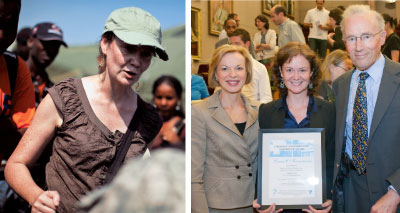Ivers Honored for Compassionate Leadership

At left, Louise Ivers in post-earthquake Haiti; at right, with BWH President Betsy Nabel, MD, and Howard Hiatt, MD, during the Thomson Award ceremony.
For her leadership and compassion in the aftermath of Haiti’s earthquake and for seven years of devotion to working side by side with the country’s poor, Louise Ivers, MD, MPH, was honored in June with the 2010 Thomson Compassionate Leadership Award at BWH.
“I’m humbled by your choice to give me this award, and I’m proud to carry the name and legacy of Dennis Thomson, a man who I never met in person but whose reputation continues long beyond his time,” Ivers told those gathered in the Bornstein Amphitheater, including Thomson’s widow, Betsy Broadman, and son Jeff Thomson.
During the award ceremony, Ivers held back tears as she thanked her colleagues, friends and BWH for the support. She also expressed hope that this award will not bring her personal visibility, but rather highlight the work that many people do in countries like Haiti and the need to continue to support it.
“We try to bring health to the destitute poor, and we stand shoulder to shoulder with the forgotten; we practice pragmatic solidarity in the darkness, and our efforts are meant to be an antidote to despair,” said Ivers, an infectious disease specialist who began working in Haiti seven years ago to strengthen HIV and TB care and prevention.
When the earthquake struck on Jan. 12, Ivers narrowly escaped a collapsing building and immediately began caring for injured survivors with any resources she could find, creating splints out of license plates. She was the sole physician at a makeshift clinic in Port-au-Prince and did not sleep until help began arriving more than 48 hours later.
“Even under the most stressful conditions one could encounter, Dr. Ivers displayed the heroic qualities of a dedicated physician leader,” wrote long-time colleague Paul Farmer, MD, PhD, chief of the BWH Division of Global Health Equity and co-founder of Partners In Health. “She provided care that only the most skilled of physicians could provide, and she maintained her composure at a time when it would seem impossible to do so, displaying a compassionate, selfless drive to help those most in need.”
In the months since the tragedy, her work has shifted focus. She moved from rural St. Marc to Port-au-Prince and works mainly with the settlement camps where thousands of displaced people live. She and her team provide health care, accompany patients and facilitate partnerships with the Haitian government, the U.S. Military, Red Cross and other organizations to bring resources and services to people desperately in need.
“Despite the tragedy of its history and even the earthquake, the Haitian people are really full of hope, and that’s a contagious feeling,” Ivers said.